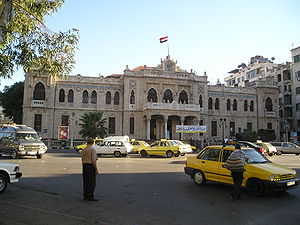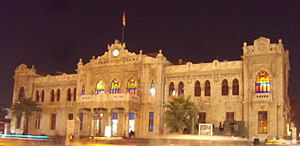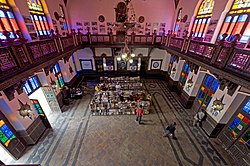Hejaz Railway Station, Damascus
Appearance
(Redirected from Damascus railway station)
Hejaz railway station محطة الحجاز | |||||
|---|---|---|---|---|---|
 | |||||
| General information | |||||
| Location | Hejaz Square, Al-Qanawat, Damascus, Syria | ||||
| Coordinates | 33°30′40″N 36°17′42″E / 33.511149°N 36.294949°E | ||||
| Line(s) | Hejaz railway | ||||
| Construction | |||||
| Architect | Fernando De Aranda | ||||
| History | |||||
| Opened | 1913 | ||||
| Closed | 1920 | ||||
| |||||
Hejaz railway station (Arabic: محطة الحجاز, French: Gare du Hedjaz) is a former main railway station in central Damascus, Syria, close to the Marjeh Square. It was built as part of the Hejaz railway project.
The station was put into operation under the Ottoman Empire in 1907, when the first section of the line to the south of Tabuk was opened.[1] In 1909 the trains circulated frequently between Damascus and Medina.[2]

The passenger building, designed by the Spanish architect Fernando De Aranda, was commissioned in 1913.[3] The building later became a historical monument and a Swiss-made locomotive was exhibited in front of it.[4]

The station's interior has a decorated ceiling. The actual platforms of the station are closed.[4]
See also
[edit]Wikimedia Commons has media related to Hejaz railway station, Damascus.
References
[edit]- ^ Hejaz Railway: 100 years after the first departure 21/9/2008 Archived 8 March 2016 at the Wayback Machine
- ^ Maurice Sartre (1 January 1999). "Damas-Médine, le chemin de fer des archéologues" (in French). L'Histoire. Archived from the original on 3 March 2016. Retrieved 30 April 2015.
- ^ Burns, Ross (2005), Damascus: A History, Routledge, p. 259, ISBN 9780415271059
- ^ a b Anne Barnard (25 May 2014). "Once Bustling, Syria's Fractured Railroad Is a Testament to Shattered Ambitions". New York Times. Retrieved 30 January 2022.

